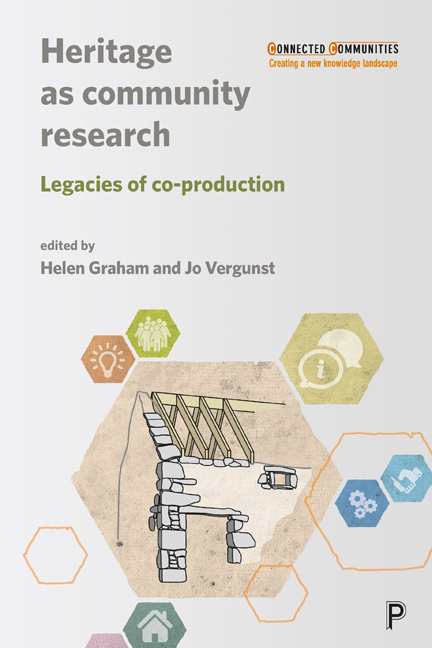seven - Do-it-yourself heritage: heritage as a process (designing for the Stoke ‘Ping’)
Published online by Cambridge University Press: 27 April 2022
Summary
Introduction
The stage was set: a hidden gem and ‘secret’ space; a pool of tiles, different colours and shapes. Across the room was a cascade of ceramic fragments. Further away from the entrance was a bookcase full of books and pamphlets. Buckets and scrapers were positioned around the walls. Tea and cakes stood ready to be served on beautifully patterned, eclectically mismatched services. The day was 27 June 2015 and the occasion was a Do-It-Yourself Heritage Day at Minton Free Library on London Road in Stoke-on-Trent.
We want to take you into the anatomy of this event to introduce the idea of do-it-yourself (DIY) heritage, that is, heritage as it is produced through people's actions, conversations and relationships. Danny Callaghan, Jan Roberts, Jayne Fair and Phil Rowley organised and ran these events under the banner of Ceramic City Stories (other volunteers present included, Simon Ball, Phil Rawle, Jane Wells, Kristian Foster and Steve Shaw). Danny Callaghan was involved with Karen Brookfield (Heritage Lottery Fund [HLF]) and Helen Graham (University of Leeds) in a project ‘How should heritage decisions be made?’. Karen and Helen came to take part in the Do-It-Yourself Heritage Day having visited Danny in Stoke as part of the research project in order to explore and articulate DIY heritage approaches. This chapter is a product both of the ‘How should heritage decisions be made?’ research (Bashforth et al, 2015, 2017) and two follow-up conversations in 2016 and 2017. In these conversations, the Ceramic City Stories group reflected with Karen and Helen on the ways in which the group has used the approaches deployed at the Do-It-Yourself Heritage Day events at the Minton Library to grow and to develop ways to collaborate.
Underpinning this article – drawing on current debates in critical heritage studies (Smith, 2006) and community-led research (Burns, 2007; Facer and Enright, 2016) – is an exploration of both ‘heritage’ and ‘knowledge’ as emerging through social processes. Recognising heritage as a process has been a crucial critical intervention; it has challenged the idea of heritage as a value fixed in an object or building through preservation and managed by expert-led organisations on behalf of a public.
- Type
- Chapter
- Information
- Heritage as Community ResearchLegacies of Co-production, pp. 149 - 170Publisher: Bristol University PressPrint publication year: 2019



